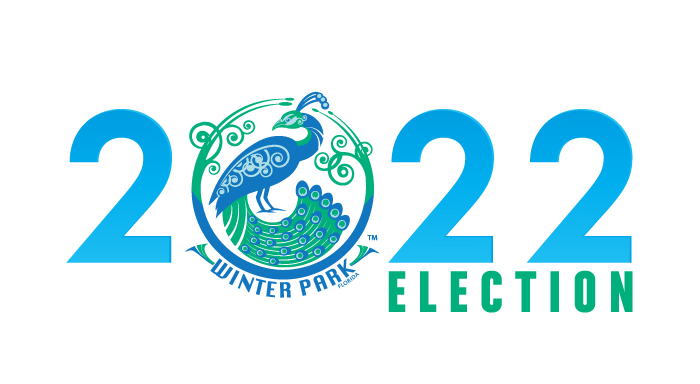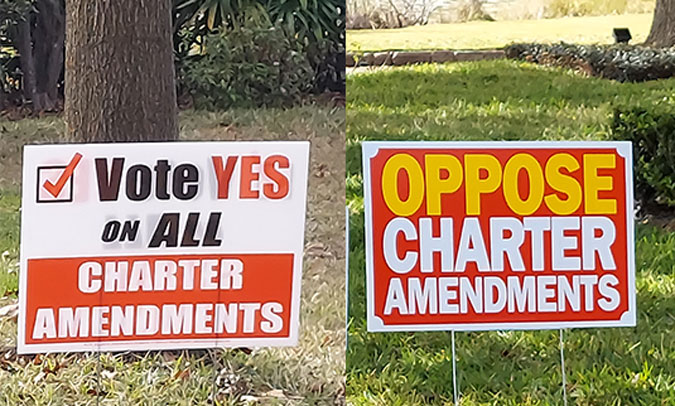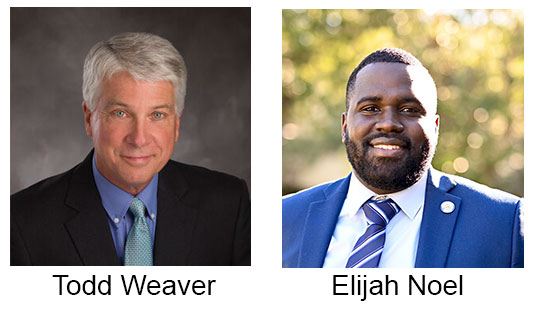
by Anne Mooney | Mar 1, 2022 | Election
Don't Just Vote. Serve On A City Board!
One thing is clear every election season: Winter Park voters are passionate about their city. Emotions run high even when turnout is low.
But turnout shows civic pride, so do your research and get ready, Winter Parkers. If you’re not voting by mail or voting early this week, show up at your polling place on March 8.
Better yet, demonstrate even more civic pride by volunteering to serve on one of Winter Park’s two dozen advisory boards and commissions. It’s a guaranteed way to make a difference in how the city conducts its business. Volunteers are always needed and some openings will need to be filled as soon as this month.
If you’re interested, click here and take a look at your options. Boards and commissions have different levels of responsibility. Some, such as the Parks and Recreation Board, are purely advisory. They may recommend policy and budgets. Others, such as the Planning and Zoning Commission and Board of Adjustments, have quasi-judicial responsibilities similar to those in a court of law. Still others, like the Nuisance Abatement Board, have the power to levy fines against code violators.
When you’ve found a board that fits your interests, work experience and/or education, click on the “Apply” option in the upper right-hand corner of the boards page and complete the application form. Don’t delay. Picking board appointees will be among the first duties of a newly elected commissioner at the March 23 commission meeting.
The board appointment process changed two years ago when voters approved changes in the city charter. For a period of time prior to that, the city’s mayor made all appointments. Now, the mayor appoints three people to the seven-member boards and each of the four commissioners makes one appointment per board. Appointments take into consideration an applicant’s specialized knowledge and experience.
To comment or read comments from others, click here →

by Anne Mooney | Feb 26, 2022 | Election
A Unique City's Brand
by Geri Throne / February 26, 2022
Winter Park residents know they live in a special place. But what makes this city truly distinct? And what should it look like in a decade or two?
The Voice asked city commission candidates those questions to get a sense of how they define the city’s core identity now and what they want it to be like in the future.
The questions were inspired by the city’s current conversation with the Chamber of Commerce and economic development board about branding the city. City brands are more than just a logo or a slogan. Experts say they require focus and a vision for the future. The biggest challenge for those answering the questions was narrowing the city’s many attributes – its tree canopy, neighborhoods, chain of lakes, business district, arts, Rollins College, its parks – into a focused vision.
Two commission seats are on the March 8 ballot: Anjali Vaya and Kris Cruzada face each other for Seat 3 and Elijah Noel is running against incumbent Todd Weaver for Seat 4.
SEAT 3
For Cruzada, the city’s core identity centers around the resiliency of its neighborhoods, as well as its relatively low density and tree canopy. The city’s founders in the late 1800s established neighborhoods as key to the city’s future, he said. Winter Park’s many amenities promote an interconnectedness. “We’re a neighborhood community.” he said. Besides attracting visitors, he’d like a brand to reach people who grew up here to persuade them to return, as he did with his family 15 years ago.
In an ideal future, Cruzada said, Winter Park’s traffic would move better because people will have moved away from gas-fueled cars. Residents would have more walkable corridors along narrower highways and use other forms of transportation. “There would be more interconnectedness.” The city would be more diverse and would be an international destination.
For Vaya, a local business owner, the heart of the city’s identity is its charm, character and unique businesses. “It has small-scale businesses you just don’t see anywhere else.” A brand needs a strong economic plan as its foundation, she said, and that requires good data. She would first want to survey both residents and businesses to find out what they want for the city in the next five years. The city needs to be very specific about what businesses it needs to attract, she said. “We have to make sure we have an economic plan that makes everyone happy.”
In the future, Vaya envisions enhancements to the city’s small-scale quality. She sees more pedestrian and bicycle paths connecting the city’s main assets, such as its parks, library and downtown. “Winter Park is small enough to make that happen.” She’d like to see a transit system connected to SunRail, perhaps to include additional Lynx bus connections and shuttles funded by private-public partnerships.
SEAT 4
Todd Weaver describes the city as “a premier urban village.” Winter Park is distinctive, he said, because of its long history of shaded brick streets and well-cared-for lakes, combined with the many cultural elements that have been added through the years. “I think Winter Park already has a very unique brand.” The way to retain that image is to avoid building larger and larger buildings as other Orlando suburbs have, said Weaver, who sees no need to attract more tourists.
In the future, Weaver would like to see the city’s housing stock increase with the addition of medium density residential zones in areas where roads and infrastructure could handle it. He envisions a more stable tree canopy, a more diverse business base and fewer cars on the road. The city also would be taking more steps to protect the environment, including using reclaimed water for irrigation.
Weaver’s opponent, Elijah Noel, declined to talk to the Voice for this article unless questions were submitted in writing in advance.
To comment or read comments from others, click here →

by Anne Mooney | Feb 20, 2022 | Election, News
A Decades-Old Debate
by Geri Throne / February 2022
To develop or not to develop; that’s a question Winter Park has debated for decades.
These days, with little unused space left in the city, the question has more to do with redevelopment. Should a golf course be developed as a subdivision? Should a lakefront residential lot become part of a commercial project? Should a swampy parcel be filled with dirt to build a home?
How the city should deal with such questions is the subject of six city charter amendments on the March 8 ballot. Five would set a higher bar for major land-use decisions involving wetlands construction, lakefront zoning, parks, residential density and the sale of city-owned property. A “supermajority” vote of 4-1 would be required for approval in certain situations, instead of a simple 3-2 majority. The sixth amendment would require an additional public hearing if a project changes considerably after it was submitted.
Sentiment for and against the amendments is evident. E-mails are clogging inboxes. Signs are popping up all over town.
Opponents sympathetic to development say the amendments set too high a bar and would make future land-use change impossible. Supporters concerned about preserving the city’s character say the amendments wouldn’t stop growth but would result in more compromise and public involvement for major changes.
PAST CLASHES OVER DEVELOPMENT
Tension between commercial and residential priorities has a long history in Winter Park. In the 1950s, as Interstate 4 was being designed, a push to extend Lee Road to downtown Winter Park failed as a result of residents’ objections. A decade later, neighborhood opposition squelched the dream of two consecutive mayors who wanted highway bridges built over Lakes Osceola and Killarney. The mayors’ priority was to move traffic easily to the new university east of the city.
Every decade since has seen clashes over land use. In the 1970s, the battle was over building heights. In later years, it was over road widenings, new subdivisions and the expansions of such established entities as the Winter Park YMCA, the Winter Park Hospital and Rollins College.
In the late 2000s, the biggest issues were the proposed SunRail commuter train and the Carlisle mixed-use high-rise. SunRail and its downtown station prevailed. The Carlisle – a massive condominium and retail building – didn’t. The high-rise would have loomed over Central Park in the current Post Office location. A two-year fight ended with the city buying out the developer with reserve funds and residents’ donations.
THE CURRENT CHARTER DEBATE
Among those supporting the charter changes are all current city commissioners and 1000 Friends of Florida, an organization that advocates for smart growth. The nonprofit group, which endorsed all six amendments, has advocated for a decade for supermajority votes when land-use changes can affect a city’s unique sense of place. Last year, it reaffirmed its support of supermajority votes. Its president, Paul Owens, said such changes “should have the highest level of support” and deserve more than a simple 3-2 majority. You can find the 1000 Friends of Florida document here.
Other amendment supporters say a 3-2 vote is too easy for major land-use changes unlikely to be reversed. Take the sale of rare city-owned land, says Winter Park Mayor Phil Anderson. “Once sold, the opportunity to use it for vital city operations is gone.” The same irreversibility applies to rezoning parks, he says, noting that currently it would take only three commission votes to decide to sell the West Meadow of Central Park and rezone it for offices and condos.
Anderson notes the importance of carefully considering land-use changes that could affect property values and alter the city’s quality of life. For such changes to pass with a 4-1 vote, commissioners would have to discuss them thoroughly and reach consensus. Compromise would be likely.
Opponents of the charter changes include former mayors Steve Leary and Ken Bradley and former commissioners Pete Weldon and Sara Sprinkel. Weldon filed last month to create the Winter Park Governance political action committee, which mailed out fliers against the amendments. The bulk of the PAC’s budget was contributed by real-estate developer Allan E. Keen’s company, Keewin LLC, which gave $10,000.
Weldon’s posts online describe the issue through the lens of past commission decisions. He accuses the current commission of being afraid that its use of Progress Point on Orange Avenue as a park could be overturned in the future. He sees the amendment on lakefront lots to be tied to the since-abandoned proposal for a hotel on Lake Killarney. The amendment dealing with residential density increases arose from the Orange Avenue Overlay debate, he says.
The amendments “will deter investment, paralyze Winter Park, and make serving on the city commission meaningless,” Weldon said in a Jan. 6 post.
SUPERMAJORITY VOTES NOT NEW
Central Florida is no stranger to supermajority votes. Neighboring Seminole County, for example, recently required them to dispose of natural land that the county obtained for conservation.
Supermajority votes aren’t new to Winter Park either. Previously, the city code required them for such decisions as changes to the city’s comprehensive land-use plan. But that requirement was dropped in 2013 when Ken Bradley was mayor. All mention of supermajority votes was scrubbed from the code.
Dropping the code requirements was easy because code changes need only the vote of three commissioners.
Changing the city charter, however, is much harder. Commissioners must ask voters for approval. So, if a majority of city voters approve the amendments this election, it would take a majority of city voters to remove them in the future. Think of the charter as a local constitution. It defines the essentials of how a city government works, its organization, powers and functions. Voters alone can amend it.
In the March 8 election, Winter Park voters will decide whether to set that high bar for major zoning and land-use changes in the future.
To comment or read comments from others, click here →

by Anne Mooney | Feb 11, 2022 | Election
Winter Park Candidates Stake Their Positions
by Geri Throne / February 11, 2022
As the March 8 city election nears, the candidates for Winter Park City Commission sometimes sound pretty similar. In their public debates and appearances, all four voice support for values most Winter Park voters hold dear: preserving the city’s unique character; valuing its green space; keeping a lid on taxes.
Similarities are especially evident in the Seat 3 race between entrepreneur Anjali Vaya and attorney Kris Cruzada. In the Seat 4 race, however, stark differences are the rule between incumbent Todd Weaver and challenger Elijah Noel.
SEAT 4 CONTRASTS

In recent forums and debates, Weaver, who is running for his second term, touted his record on issues such as green space and development and endorsed all six city charter amendments on the ballot. An aerospace and mechanical design engineer, he attended the University of Central Florida.
Noel, a 2020 Rollins College graduate with a degree in international business, sees little to like in the current commission. He accused the board of seeking more green space than the city needs and trying to concentrate power in the hands of a few. He asked for the votes of people “discontented with what the city commission is doing.”
A two-year resident of Winter Park, Noel manages a downtown Orlando lounge. He previously worked on the campaigns of former mayor Steve Leary and commissioner Sarah Sprinkel. “I’m running because I’ve noticed a lot of change in the mindset of the city commission, a change from forward thinking to a lot more stagnation,” he said.
Weaver, on the other hand, said he is proud of the current commission and its handling of pandemic-related economic challenges and development. In an effort to achieve unanimous votes, he said, the commission often negotiates during debate on decisions. “Everyone gives and takes a little bit. That was lacking when I first became commissioner.” Weaver has lived 25 years in his Lake Bell neighborhood, which was annexed into Winter Park in 2004.
SEAT 3 UNANIMITY
 In the Seat 3 race, Anjali Vaya and Kris Cruzada both have expressed support for buying the Winter Pines golf course. Both said the Post Office should stay at its current downtown location if possible, but the city should be prepared to negotiate if the Postal Service decides to move. If the city acquires the site, they both said, the land should become green space. Both endorse the proposed charter amendments on the March 8 ballot.
In the Seat 3 race, Anjali Vaya and Kris Cruzada both have expressed support for buying the Winter Pines golf course. Both said the Post Office should stay at its current downtown location if possible, but the city should be prepared to negotiate if the Postal Service decides to move. If the city acquires the site, they both said, the land should become green space. Both endorse the proposed charter amendments on the March 8 ballot.
The two bring differing backgrounds and professional experience to the race, however. Cruzada has degrees and work experience in both accounting and law — skills he says would serve him well as a commissioner dealing with budgets, financial analyses, codes and statutes. He has a sole-practice law firm and also is a director in a family-owned land-management business. Cruzada spent his childhood in Winter Park and moved back in 2006. He serves on Orange County’s Development Advisory Board.
Vaya’s strength is in technology. After earning a master’s degree in healthcare administration and working in that field, she developed a furniture e-commerce website and then formed a technology consulting business in the Northeast. A native of Zambia, she became a U.S. citizen in 1999 and moved to Winter Park in 2007. She says her ownership of two technology businesses helps her understand the needs of small business and the importance of good communication. She is vice-president of the Indian American Chamber of Commerce and sits on the citizen advisory board to Winter Park’s Community Redevelopment Agency. She ran unsuccessfully for the Orange County Commission in 2020.
GREEN SPACE A BIG ISSUE
In debates, Noel has accused the city of wasting money turning the Progress Point lot on Orange Avenue into a park and buying the Winter Pines Golf Course when the money would be better used to fix roads and sidewalks. “We’re spending a lot of money on a lot of property we can’t afford to maintain.” Calling himself a “huge advocate for green space,” he said he would emphasize quality over quantity.
Weaver made no apologies for wanting to add more green space. “I want to keep the park in Winter Park.” The city has a budgeted schedule for repaving its hundreds of miles of roads and it already owned the Progress Point site, he said. The city won’t need taxpayer money to buy the Pines golf course or maintain it because “it’s a profitable business,” he said.
Both Vaya and Cruzada agreed with the commission’s desire to buy the Pines golf course and described the $7.4 million purchase price as a good deal. Vaya praised the commission for its debate on the deal. “There was a lot of dialogue and transparency in the meeting that night.” Cruzada, who lives along the golf course, said the city followed the rules. He noted that the city charter doesn’t require referendum approval to buy parkland. He said the city should identify more money-making opportunities at the course so it can pay back the bond issue quickly.
ORANGE AVENUE OVERLAY
Noel criticized the city commission for rejecting a task force’s advice for the redevelopment of Orange Avenue. If elected, he would “listen to the experts,” he said. “It’s our job as leaders not to assume we’re experts on building and zoning codes, but to study on it, listen to residents and make the best judgments.” The city should install a money-making use at Progress Point Park to help pay for its maintenance, he said, so it is “not just another park with more trees.”
Weaver said the commission was justified in repealing the initial Orange Avenue redevelopment plan, which was proposed by property owners and recommended by city staff. “It was very controversial.” The current plan is “more fair,” he said. He noted that the revised version includes incentives for developers to provide workforce housing.
CHARTER AMENDMENTS
Weaver and Cruzada described as “no brainers” the charter amendments requiring four votes for irreversible decisions. They both gave examples. “We don’t want to make it easy to build in wetlands,” Weaver said. Four votes would ensure that the city has a compelling reason for selling its property, Cruzada said. “Once you sell, you can’t get it back,” he said.
Vaya noted that the city previously required supermajority votes for such decisions. Asking voters to put the requirement in the city charter “will go a long way in protecting the city’s charm” and will reduce divisiveness, she said. Noel opposes all six amendments. He described the charter changes as a way of “keeping the power in one place” and reiterated that the city isn’t “hearing enough from its residents.
To comment or read comments from others, click here →

by Anne Mooney | Jan 31, 2022 | Zoning and Development
Winter Pines Golf Course Has Good Round
by Geri Throne / January 31, 2022
Now that Winter Park commissioners have decided to pursue buying the 18-hole Winter Pines Golf Course, the next step is how to pay for it.
A 20-year municipal revenue bond is likely. A price tag of $7.4 million would give the city a busy 18-hole public golf course, pro shop/snack bar, driving range and maintenance buildings and equipment.
In recent years, the privately-owned course has netted more than $600,000 annually. Even if that revenue drops, city staffers told commissioners last week, it should be enough for the debt service. A bond issue would not require voter approval because it is for parkland.
Redevelopment Pressure
Despite concerns about future costs and a waning national interest in golf, commissioners were attracted by the opportunity to add 93.13 acres to the city’s green space and stop owners’ attempts to redevelop the site.
Over the past three years, Winter Pines golf course owners have twice approached the city with plans to convert all or part of the site’s zoning from parks-and-recreation to residential. Each time, they withdrew after learning about impediments to redevelopment in the city’s comprehensive plan for future land use.
The comp plan, as it is called, guides important city policy decisions about growth and change, but the document isn’t set in stone. Right now, all it takes is a simple majority vote of three commissioners to revise it. Proposed city charter amendments on the March 8 ballot would set a higher bar for major revisions. For example, applications to turn parkland into a subdivision would require a supermajority of four votes to pass. Such requests could still be approved, Mayor Phil Anderson points out, but they’d face higher standards. “For me, as a resident, anything that makes a significant and irreversible change to the city deserves a higher standard of care. The key for me is, is it irreversible?”
City commissioners hope the purchase of the course guarantees it remains open space. If it stays in private hands, redevelopment pressure is sure to continue, City Manager Randy Knight told commissioners. The reason is simple economics. Rezoning the land into developable property would make its value leap to $30 million – more than five times its value as a golf course.
An Offer to Sell
Negotiations for the purchase began months ago, after the owners presented an offer to sell the city the golf course. The $7.4 million price tag mirrors the $14.8 million that Seminole County paid last year for two courses. The Pines owners asked for more than the $5.8 million assessed value because it is giving up potential development rights, Knight said.
Commissioners unanimously agreed on entering the contract. Commissioner Carolyn Cooper expressed the most reservations. The city needs to be ready to make improvements to the property to enhance its revenue, she said, noting that the sport of golfing has seen a “serious decline in participation” since 2008. “I don’t want taxpayers to have to subsidize yet another golf course,” she said.
Abandoned golf courses have become a national trend as the sport’s popularity has declined. Some owners have redeveloped the land into everything from homes to detention ponds. Some owners have just walked away. Others have sold the courses to cities and counties, which either convert them into public open space or keep them open. That’s what happened in Seminole County, where cities and the county have bought up five privately owned courses since 2015.
Commissioners envisioned a number of additional uses for the Pines property under city ownership, from a restaurant to Frisbee golf. They agreed with Commissioner Sheila DeCiccio that a citizen advisory board be created to assist with the transition to a city-owned facility.
Commissioner Marty Sullivan supported the purchase, even if the course ends up costing taxpayers money to maintain. “There is that risk of it potentially costing us. I am okay with the risk because green space costs us money. It’s an asset to the city and residents.”
As the hearing last week drew to a close, city planner Jeff Briggs added his personal endorsement. “I’ve been coming to these meetings for 40 years. Rarely does the city commission get a chance to make a decision that’s forever. We need to celebrate.”
To comment or read comments from others, click here →







Recent Comments